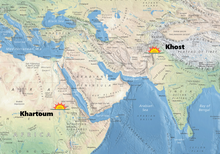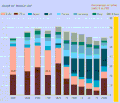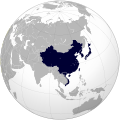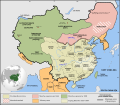
Back بوابة:آسيا Arabic ܬܪܥܐ:ܐܣܝܐ ARC Portal:Asiya Azerbaijani Партал:Азія BE-X-OLD প্রবেশদ্বার:এশিয়া Bengali/Bangla دەروازە:ئاسیا CKB Portal:Asien German Portal:Asya DIQ Πύλη:Ασία Greek Portal:Asia Spanish

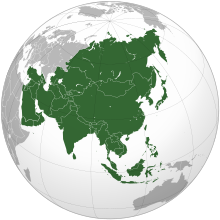 Asia (/ˈeɪʒə/ AY-zhə, UK also /ˈeɪʃə/ AY-shə) is the largest continent in the world by both land area and population. It covers an area of more than 44 million square kilometers, about 30% of Earth's total land area and 8% of Earth's total surface area. The continent, which has long been home to the majority of the human population, was the site of many of the first civilizations. Its 4.7 billion people constitute roughly 60% of the world's population. Asia shares the landmass of Eurasia with Europe, and of Afro-Eurasia with both Europe and Africa. In general terms, it is bounded on the east by the Pacific Ocean, on the south by the Indian Ocean, and on the north by the Arctic Ocean. The border of Asia with Europe is a historical and cultural construct, as there is no clear physical and geographical separation between them. It is somewhat arbitrary and has moved since its first conception in classical antiquity. The division of Eurasia into two continents reflects East–West cultural, linguistic, and ethnic differences, some of which vary on a spectrum rather than with a sharp dividing line. A commonly accepted division places Asia to the east of the Suez Canal separating it from Africa; and to the east of the Turkish Straits, the Ural Mountains and Ural River, and to the south of the Caucasus Mountains and the Caspian and Black seas, separating it from Europe. China and India traded places as the largest economies in the world from 1 to 1800 CE. China was a major economic power for much of recorded history, with the highest GDP per capita until 1500. The Silk Road became the main east–west trading route in the Asian hinterlands while the Straits of Malacca stood as a major sea route. Asia has exhibited economic dynamism as well as robust population growth during the 20th century, but overall population growth has since fallen. Asia was the birthplace of most of the world's mainstream religions including Hinduism, Zoroastrianism, Judaism, Jainism, Buddhism, Confucianism, Taoism, Christianity, Islam, Sikhism, as well as many other religions. (Full article...) Featured articleOperation Infinite Reach was the codename for American cruise missile strikes on al-Qaeda bases that were launched concurrently across two continents on 20 August 1998. Launched by the U.S. Navy, the strikes hit the al-Shifa pharmaceutical factory in Khartoum, Sudan, and a camp in Khost Province, Afghanistan, in retaliation for al-Qaeda's August 7 bombings of American embassies in Kenya and Tanzania, which killed 224 people (including 12 Americans) and injured over 4,000 others. Operation Infinite Reach was the first time the United States acknowledged a preemptive strike against a violent non-state actor. U.S. intelligence wrongly suggested financial ties between the al-Shifa plant, which produced over half of Sudan's pharmaceuticals, and Osama bin Laden; a soil sample collected from al-Shifa allegedly contained a chemical used in VX nerve gas manufacturing. Suspecting that al-Shifa was linked to, and producing chemical weapons for, bin Laden and his al-Qaeda network, the U.S. destroyed the facility with cruise missiles, killing or wounding 11 Sudanese. The strike on al-Shifa proved controversial; after the attacks, the U.S. evidence and rationale were criticized as faulty, and academics Max Taylor and Mohamed Elbushra cite "a broad acceptance that this plant was not involved in the production of any chemical weapons." (Full article...)Selected Country Bangladesh, officially the People's Republic of Bangladesh, is a country in South Asia. It is the eighth-most populous country in the world and is among the most densely populated countries with a population of nearly 170 million in an area of 148,460 square kilometres (57,320 sq mi). Bangladesh shares land borders with India to the north, west, and east, and Myanmar to the southeast. To the south, it has a coastline along the Bay of Bengal. It is narrowly separated from Bhutan and Nepal by the Siliguri Corridor, and from China by the mountainous Indian state of Sikkim in the north. Dhaka, the capital and largest city, is the nation's political, financial, and cultural centre. Chittagong is the second-largest city and is the busiest port on the Bay of Bengal. The official language of Bangladesh is Bengali while Bangladeshi English is also used in the government and official documents alongside Bengali. Bangladesh forms the sovereign part of the historic and ethnolinguistic region of Bengal, which was divided during the Partition of India in 1947 as part of a Muslim union with Pakistan, which it separated from in a bloody independence war in 1971. The country has a Bengali Muslim majority. Ancient Bengal was known as Gangaridai and was a bastion of pre-Islamic kingdoms. Muslim conquests after 1204 heralded the sultanate and Mughal periods, during which an independent Bengal Sultanate and a wealthy Mughal Bengal transformed the region into an important centre of regional affairs, trade, and diplomacy. After the Battle of Plassey in 1757, the maximum extent of British Bengal stretched from the Khyber Pass in the west to Singapore in the east. The creation of Eastern Bengal and Assam in 1905 set a precedent for the emergence of Bangladesh. The All India Muslim League was founded in Dhaka in 1906. In 1940, the first Prime Minister of Bengal, A. K. Fazlul Huq, supported the Lahore Resolution. Before the partition of Bengal, a Bengali sovereign state was first proposed by premier H. S. Suhrawardy. A referendum and the announcement of the Radcliffe Line established the present-day territorial boundary. (Full article...)Featured biographyShah Rukh Khan (pronounced [ˈʃɑːɦɾʊx xɑːn] ; born 2 November 1965), also known by the initialism SRK, is an Indian actor and film producer who works in Hindi cinema. Referred to in the media as the "Baadshah of Bollywood" and "King Khan", he has appeared in more than 100 films, and earned numerous accolades, including 14 Filmfare Awards. He has been awarded the Padma Shri by the Government of India, as well as the Order of Arts and Letters and Legion of Honour by the Government of France. Khan has a significant following in Asia and the Indian diaspora worldwide. In terms of audience size and income, several media outlets have described him as one of the most successful film stars in the world. Many of his films thematise Indian national identity and connections with diaspora communities, or gender, racial, social and religious differences and grievances. Khan began his career with appearances in several television series in the late 1980s and made his Bollywood debut in 1992 with the musical romance Deewana. He was initially recognised for playing villainous roles in the films Baazigar (1993) and Darr (1993). Khan established himself by starring in a series of top-grossing romantic films, including Dilwale Dulhania Le Jayenge (1995), Dil To Pagal Hai (1997), Kuch Kuch Hota Hai (1998), Mohabbatein (2000), Kabhi Khushi Kabhie Gham... (2001), Kal Ho Naa Ho (2003), Veer-Zaara (2004) and Kabhi Alvida Naa Kehna (2006). He earned critical acclaim for his portrayal of an alcoholic in the period romantic drama Devdas (2002), a NASA scientist in the social drama Swades (2004), a hockey coach in the sports drama Chak De! India (2007), and a man with Asperger syndrome in the drama My Name Is Khan (2010). Further commercial successes came with the romances Om Shanti Om (2007) and Rab Ne Bana Di Jodi (2008), and with his expansion to comedies in Chennai Express (2013) and Happy New Year (2014). Following a brief setback and hiatus, Khan made a career comeback with the 2023 action thrillers Pathaan and Jawan, both of which rank among the highest-grossing Indian films. (Full article...)General imagesThe following are images from various Asia-related articles on Wikipedia. Featured picture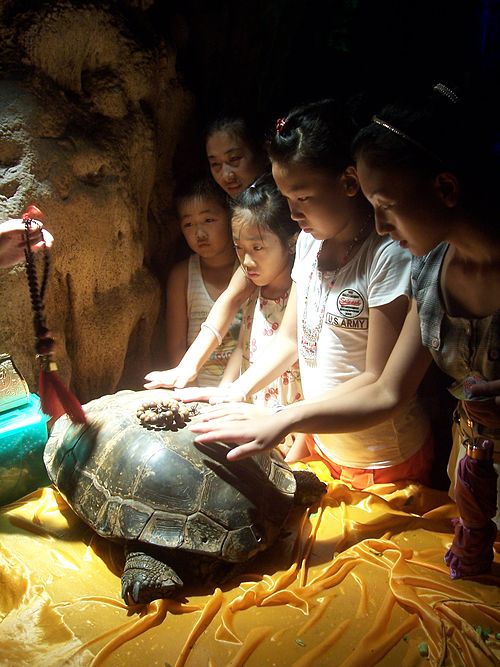 Credit: Paul Munhoven In the grotto of the flute reeds, China, a family shows reverence for an ancient turtle. The turtle is a symbol of longevity throughout many parts of Asia. Its four feet represent the four corners of the earth, its endurance is considered to last 10,000 years. A symbol of good luck and long life, many turtles are pushed towards extinction by consumption in Chinese medicine.
Did you know...
Updated: 6:33, 14 February 2024 In the news
Related portalsMajor Religions in Asia Middle East Central Asia and Surroundings Indian Subcontinent Southeast Asia East Asia Selected panorama
The Ratchaprasong and Sukhumvit skylines of Bangkok, the capital of and largest city in Thailand, with Lumphini Park in the center, as viewed from the Sathon District. Known in Thai as Krung Thep ("city of angels"), it became the capital in 1768 after the destruction of Ayutthaya by Burmese invaders. TopicsCategoriesAssociated WikimediaThe following Wikimedia Foundation sister projects provide more on this subject:
More portalsShortcuts to this page: Asia portal • P:ASIA Purge server cache |
© MMXXIII Rich X Search. We shall prevail. All rights reserved. Rich X Search
